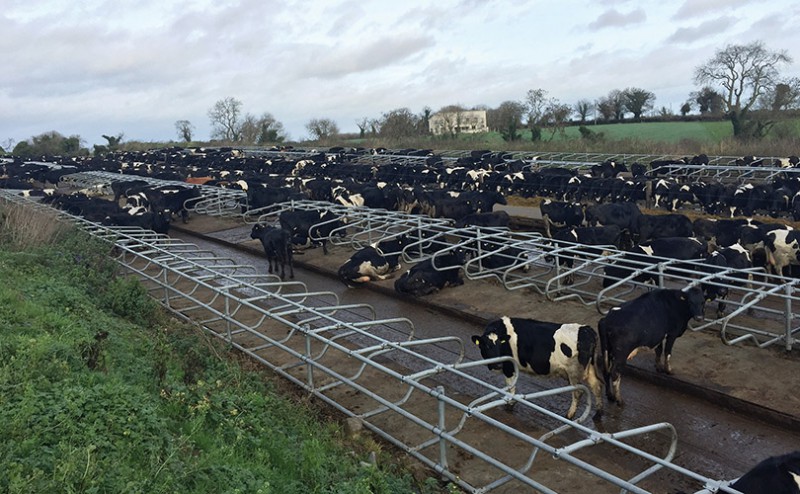
The Leonard family have been farming in Stamullen, Co. Meath for almost a century. Joseph Leonard, a 2014 Nuffield scholar, is currently milking 500 cows on his Balloy Farm and is also involved with his younger brother Michael in Bellewstown Golf Course, a business they set up together in 2004.
In the last 12 months, Joseph – who carries out the farm duties with his brother Matthew, father Simon and Rob Loosley – has increased the size of his dairy herd from 300 to 500 cows. This has been made possible by a partnership with a neighbouring farm which has brought in an additional 45 hectares and extra winter housing.
“We have ramped up our milk production over the past few years,” explains Joseph, who was awarded the 2014 Nuffield Scholarship.
“We’ve gone from milking 180 cows 10 years ago to 500 now. We upped the herd size to 300 in 2012 after buying extra milk quotas, and we’ve been able to expand further thanks to the abolition of the quota system last April and the partnership we entered into with Darragh McCullagh of Ear to the Ground fame and his father Eamon, which has worked out well for both parties. We are currently farming about 550 acres between our own land and land which we rent.”
The expanded crossbred herd produces 2.2 million litres of milk per year, which is supplied to Lakeland Dairies in Bailieborough, Co. Cavan. The Leonards are among 2,200 dairy farmers who supply to the Lakeland Dairies Group, which processes about 1 billion litres of milk annually into a range of valued added dairy foodservice products and functional dairy food ingredients that are exported to 70 countries worldwide.
Balloy Farm wouldn’t be the busy enterprise it is today if the Leonard’s hadn’t adopted a low-cost philosophy in their approach to grass-based milk production system and to their facilities. The 40-unit milking parlour was built by Joseph, Matthew and Simon in the winter of 2009/2010. They also constructed a six million-litre lined lagoon in 2008, while a 500-place topless cubicle unit was also built in 2009 on the site of an existing wintering pad. In 2012, a tunnel was constructed to link the two sections of the milking platform together.
Apart from the obvious savings in building and structural costs, Joseph says there are many advantages to topless cubicles.
“I would highly recommend topless cubicles to any dairy farmer. The rising cost of woodchip was one of the main reasons why we opted for this unit. There is less effluent as we’ve reduced the overall size of our wintering facilities,” he notes. –
“The cows are very happy and healthy – they put on a proper winter coat when they are wintered outside. Also, there is no shock to their systems when they go out to grass in February. If you leave a gate open in a normal shed, the cows will go out. That’s a fact. We have a bank of clay beside the cubicles which keeps the wind out.”
He adds: “Our policy has always been to keep our costs as low as possible. When we built our new milking parlour, we didn’t splash out a particular brand of milking machine. We did nearly all of the work ourselves.
“We reduce our feeding costs by getting our cows out to grass as soon as possible after calving, which starts in February and runs until April. They are 98 per cent grass-fed. We feed our calves from birth once a day from the cow’s milk in the morning which reduces the labour requirement and the need for milk heating equipment. We also milk once a day in February to maximise milk price and reduce labour cost.”
Joseph isn’t unduly concerned about the low prices farmers have been receiving for their milk since the EU quotas were lifted.
“If anything, 2015 wasn’t as bad as I was expecting. Reduced milk prices had been globally forecasted due to overproduction, so I was braced for it after the high of the previous two years. I will, however, start to worry if the prices don’t show an improvement by next spring,” he says.
Married to Mairead and father to four children, Joseph was honoured to be awarded a 2014 Nuffield Ireland Scholarship for his topic ‘To investigate and develop Stress Management Systems in Farming in Ireland’. As an industry, the affable dairy farmer feels agriculture needs to recognise that the farmer is the single most important factor in the success of the business and that while technical ability/efficiency are important, it is crucial that farmers are taught to respect their own limitations and needs as well as their ambitions and capabilities.
The objective of the Irish Nuffield Farming Scholarship Trust is to identify future leaders of Irish agriculture and facilitate their ambition to bring about meaningful change for the benefit of their community.
In 2001, Joseph and Michael Leonard, with the support of their father, made the brave and radical decision to transform what had been a 150-acre beef farm in Bellewstown into a golf course. And, after building it themselves, Bellewstown Golf Course was open for business within three years.
The farm was originally purchased by Simon in the mid-1970s when a large part of the Hilltown Estate was sold, running it in conjunction with the home farm in Balloy.
Michael, who was then working in banking in Dublin, now runs the 18-hole Par 72 championship length course, which has catered for the dramatic increase in population in the area and is set to the north of Bellewstown Racecourse and with a stunning view over the surrounding countryside to the distant Mourne Mountains and the Irish Sea.
Balloy Farm Ltd,
Balloy,
Stamullen,
Co. Meath.
Email: [email protected]
Taken from Irish Tractor & Agri magazine Vol 4 No 1, January 2016